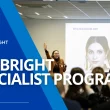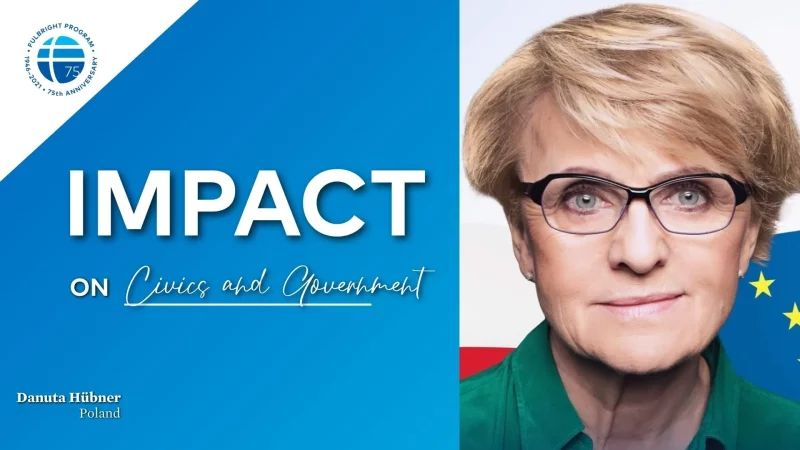In 2021 the Fulbright Program celebrates its 75th anniversary (In Poland, the Program has operated for 62 years). One of the ways in which we are joining this celebration is by presenting 12 Fulbright stories that showcase the positive impact of the Program on local and global communities. Each of these stories reflects the theme of the month. The February theme is “Civics and Government” and our Fulbright story focuses on Danuta Hübner – Fulbright alumna to the University of California, Berkeley (1987-89). More information about the Fulbright Program 75th anniversary could be found at fulbright75.org.
Professor Danuta Hübner is an economist, expert in international politics and since 2009, Polish member of European Parliament. She was the Chief Negotiator for Poland’s accession to the Organization for Economic Co-operation and Development (OECD), served as Minister of European Affairs and was appointed EU Commissioner for Trade and then Regional Policy in the European Commission.
Professor Hübner started her professional career in the 1970s as an academic at the Warsaw School of Economics. In 1987, she received a Fulbright grant to the University of California, Berkeley. While in the U.S. she was also lecturing at the San José State University. During her 2-year Fulbright grant, Prof. Hübner has been learning about the deep transitions in Poland through an American perspective and discussing them with her American colleagues. “My most important memory – I left a different Poland than the one I returned to after 2 years. In the meantime, everything has changed. Transformation that happened in Poland and discussions about it in the U.S. have immensely influenced my U.S. experience,” she says.
As Prof. Hübner recalls, during her Fulbright grant in the U.S., she received support from Professor Laura Tyson, an economist who was later associated with the Clinton administration – Tyson became Chair of the US President’s Council of Economic Advisers. “Tyson was my point of reference. She inspired me,” says Prof. Hübner. When in 1994-95, Prof. Hübner was co-creating the Government Programme “Strategy for Poland,” her American experiences have impacted her approach to the topic of competitiveness that she focused on. They also had an impact on her openness to the American perspective when she served as the Under-Secretary of State in the Ministry of Industry and Trade (1994-95). She says that as the time went by, she has become a “contact person” for Americans arriving in Poland.
“My stay in the United States made me realize that American institutions can be an important co-star in creating the European reality. The first economic policy for small and medium businesses I created as Under-Secretary of State in the Ministry of Industry and Trade was in collaboration with the United States Agency for International Development (USAID),” says Prof. Hübner. “Thanks to Fulbright, I became aware that in Europe, we can utilize American experiences to come up with new solutions. As an alumna of the Fulbright Program, it was probably easier for me to understand the value of U.S. relations than for people who have never been to the U.S.,’ she adds.
Even though Hübner admits that she left Poland with an already vast experience in academia, as a result of her work at the Warsaw School of Economics, she was impressed by the availability of resources at the U.S. higher education institutions. “What was particularly valuable to me during the Fulbright grant was access to resources from around the world. Today, in the age of the Internet, it may not sound so groundbreaking. But at the time, in Poland, such access to information was something one could only dream of,” she says. Another advantage – being able to participate in numerous conferences: “I remember one of the economic conferences in Hawaii with fascinating discussions about what is happening in Eastern Europe and where the world is heading. The opportunity to listen to innovative ideas, or theories that have not yet reached Europe was incredibly valuable. And meeting remarkable people.”
Hübner recalls that in California, she was one of the very few Polish women in her academic circle: “I had many male colleagues, but female colleagues – unfortunately not that many,” she admits.
Even at the time, the U.S. was a place where conferences on topics such as women and leadership were taking place, says Prof. Hübner. She points out that thanks to them, she has deepened her sensitivity to the issues of equality, women’s rights, and women’s presence in the public sphere. Today, Danuta Hübner is a member of numerous committees and boards, including the Advisory Board of the Women Economic Forum.
Interview by Joanna Socha, Fulbright Graduate Student Award alumna










